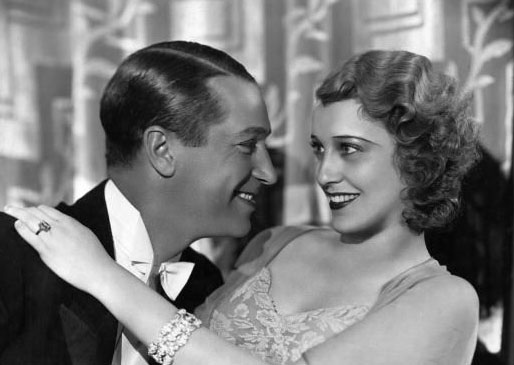
“…Lubitsch’s precise, highly stylized direction of actors, his genius for concentrating the maximum amount of narrative information in a few carefully chosen shots and symbolic details, his masterful sense of ellipsis (presenting only the most important story points and leaving the rest to the viewer’s imagination) — all these devices and more had emerged during Lubitsch’s silent-film period, and by 1929 had already been enshrined as “the Lubitsch touch.”
But Lubitsch wasn’t content to let things stand, not when faced with the transformative technical advance represented by sound. Where so many of the early musicals are simply passive records of already established stage hits (like RKO’s 1929 “Rio Rita”) or strung-together highlights that showcase a studio’s stars in various production numbers (like Warner Brothers’ “Show of Shows,” also 1929), the Lubitsch films are full-fledged book musicals that integrate their songs into their plots and frequently move, operetta style, from spoken dialogue to recitative to full musical performances. They are light, fluid and graceful at a time when the heavy apparatus of the talkies was threatening to render movies flat and stagebound.
For reviewers at the time, these movies were buoyant, witty and casual in a way the plodding stage adaptations were not. Less remarked upon then but more important in the development of the medium was Lubitsch’s innovative way of using sound.
For Lubitsch the new medium wasn’t just for recording dialogue but also for bringing out the musicality contained in sound effects. (See in “Monte Carlo” how the chugging of a train engine slips into the rhythm of “Beyond the Blue Horizon,” sung by Jeanette MacDonald.) He uses sound to suggest whole realms of off-screen space unavailable to the silent film, employing sound cues as a way of replacing dialogue (like the trumpet call in “The Smiling Lieutenant”), much as he would use visual cues to replace entire sequences of dramatic action.
Their formal and historical importance aside, these films remain marvelously adult entertainments, at ease with human desire (and its inevitable conflicts with the institution of marriage) in ways that movies of our own time either ignore or trivialize into crude physical comedy. Lubitsch’s coquettishly liberated women (Jeanette MacDonald in three of the four films here; Claudette Colbert in the fourth, “The Smiling Lieutenant”) unabashedly enjoy sex as much as their rakish mates (Maurice Chevalier in three; Jack Buchanan, a gifted but now forgotten British musical star, in “Monte Carlo”).
In “One Hour With You,” the last of Lubitsch’s musicals for Paramount (he would make one more, perhaps his greatest, for MGM: the 1934 version of “The Merry Widow”), the Chevalier character, a happily married (to MacDonald) Parisian doctor, eventually gives in, despite his better instincts, to the sexual blandishments of his wife’s best friend (Genevieve Tobin). They spend a late night together, during which, Lubitsch clearly indicates, they enjoy a sexual dalliance — for which MacDonald smilingly forgives him at the film’s conclusion. Attitudes like this would disappear with the enforcement of the Production Code in 1934, seldom to return to American movies again.”
Link to complete article


